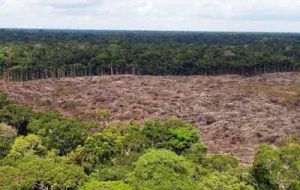MercoPress. South Atlantic News Agency
Mexico sets ground-breaking global benchmark on tacking deforestation
 The gross reduction in forest land over this 15 year period is still a staggering 218 million hectares
The gross reduction in forest land over this 15 year period is still a staggering 218 million hectares By MP Barry Gardiner and Ignacio Pichardo (*) - Below the global radar, a major victory was secured in Mexico on Tuesday 24th April in the world-wide battle to prevent deforestation and forest degradation, which are collectively the world's second largest sources of greenhouse emissions.
A set of legal amendments were approved by the Mexican Parliament that set a powerful global precedent for empowering local communities to address deforestation. In so doing, the vote also positions Mexico as the first country in the world to legislate in support of efforts to reduce emissions from deforestation and forest degradation (the so-called REDD+ agenda).
This is a crucial development, and is of global importance for several reasons.
Up until now, debate on REDD+ has predominantly been within the UN climate convention and the executive branch of governments across the world. However, approval of these legal amendments by a domestic legislature (the Mexican Congress) highlights an important transition towards engraining the approach within national legal frameworks.
In addition to this shift in focus, this Mexican package of legal reforms takes a critical step towards ensuring that local communities who sustainably manage their forests receive the economic benefits derived from any future carbon payment scheme. By enshrining this in national legislation, the Mexican Congress is building a ground-breaking, forward-looking legal framework that supports the concept that forests should be worth more alive than dead.
As important as the Mexican precedent is, however, this argument now needs to be won across a critical mass of other countries if global deforestation is to be truly addressed -- and its contribution to global warming arrested.
Although Brazil has made headlines in recent years for reducing its deforestation rates, a report published by the UN's Food and Agriculture Organization (FAO) in late 2011 showed that the global net loss of forests between 1990 and 2005 was 72.9 million hectares. This is unsustainably large, even though the net rate of loss is slowing.
Indeed, when one takes away the gains in forest area through afforestation and natural forest expansion, which is centred mostly in China and North America, the gross reduction in forest land over this 15 year period is still a staggering 218 million hectares. This is more than the combined land area of the United Kingdom, France, Germany, Spain, Italy and Portugal.
The massive scale of forest loss in this relatively short period of time highlights the importance of putting much higher value on the conservation, protection and sustainable use of these key natural assets. This is especially important as deforestation is still the world's second largest source of greenhouse gas emissions.
Without a significant reduction in forest loss rates, it will be impossible to limit global temperature rises to less than 2 degrees above pre-industrial levels, an aim recognised by the United Nations Climate Convention's Cancun Agreements in 2010. It is for this reason that REDD+ is seen as a critical part of the global mitigation strategy on global warming.
However, forests are far more than just sticks of carbon, which is why addressing deforestation is far more than purely a climate change issue. Forests provide a wide range of other ecosystem services, which are critical for the 1.6 billion people whose livelihoods are in some way dependent on them.
Furthermore, forests host a vast array of biodiversity whose existence is critical for the maintenance of the healthy ecosystems, upon which we all depend. Indeed, it is perhaps largely due to the social and ecological importance of forests that the implementation of REDD+ has become a hotly contested issue.
This is why the work of Global Legislators Organisation (GLOBE) Mexico, the cross-party group of Mexican legislators who have begun to integrate REDD+ into their national legal framework, should be so warmly applauded. Their efforts, as part of the GLOBE Legislators' Forest Initiative, which is also active in the parliaments of Brazil, the Democratic Republic of Congo, and Indonesia, have engrained in legislation the widely held view that a forest's survival depends on its value to the local community.
If this concept can be integrated into national laws around the world, the global effort to reduce deforestation will have a much stronger legal basis for success. Given the huge stakes in play, it is crucial that we succeed.
(*) Barry Gardiner MP is Special Envoy on the Environment and Climate Change to the Leader of the UK Labour Party and Vice-President of Global Legislators Organisation (GLOBE) International. Ignacio Pichardo is President of GLOBE Mexico and a former Deputy in the Mexican Parliament




Top Comments
Disclaimer & comment rules-

-

Read all commentsGood article.
Apr 28th, 2012 - 03:29 pm 0Where he says 'engrained' he means 'embedded'.
Even so, the rate of tree planting in China cannot keep pace with the rate of forest destruction in Brasil.
The world is suffering.
Very cool. It's an everyone problem not just Mexico problem as Geoff illustrated in his reference to China/Brasil. Eden Reforestation Projects www.edenprojects.org (just north of there) is planting 39,633+ trees per day. You should engage them to help. I know they're ramping up their efforts to plant 50,000,000 trees per year versus the 18,000,000 they planted last year.
May 04th, 2012 - 01:35 pm 0Commenting for this story is now closed.
If you have a Facebook account, become a fan and comment on our Facebook Page!